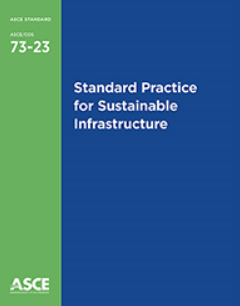ASCE’s first sustainable civil infrastructure standard promotes cost-effective resilience

First time the Society has provided consensus-based standard on sustainable solutions to infrastructure projects
January 19, 2024 — The American Society of Civil Engineers (ASCE) has released a first-of-its-kind standard, ASCE/COS 73-23: Standard Practice for Sustainable Infrastructure, that provides guidance for infrastructure owners to develop and implement sustainable solutions through a project’s entire life cycle. It is a non-mandatory, performance-based standard designed for civil infrastructure ranging from transportation projects to water systems to the energy grid, developed over a period of five years involving a multitude of diverse stakeholders.
This is a transformational standard that for the first time will establish consensus guidance on how infrastructure owners should address sustainability in their projects. As of early September, there have been 23 confirmed weather/climate disaster events in the U.S., with losses exceeding $1 billion. That’s almost one every week and a half. Sustainability and resilience are more important than ever. Infrastructure owners and designers have a responsibility to develop and implement practices that promote sustainability and long-term reliability of infrastructure projects, while also being cost-effective and collaborative with community stakeholders.
ASCE President Maria Lehman
The standard complements existing ASCE standards and tools like the Envision rating system.
As a leading source for minimum design loads through our most widely adopted standard ASCE 7-22, ASCE is in an optimal position to drive the future of sustainable infrastructure through the new ASCE/COS 73-23 standard. Implementation of this framework by policymakers, infrastructure owners and practitioners will promote mitigation and adaptation towards environmental threats, provide innovative alternatives to current construction practices, and minimize long-term costs over a project’s entire life cycle.
Cris Liban, D.Env., P.E., Dist.M.ASCE, chief sustainability officer for the Los Angeles County Metropolitan Transportation Authority
Sustainability as it pertains to infrastructure includes projects that are planned, designed, constructed and maintained in a way that balances the economic, environmental and social benefits over the entire life cycle of the project. To achieve this, ASCE/COS 73-23 calls for infrastructure owners to develop infrastructure that achieves environmental benefits and resilience measures while ensuring equity, mobility, inclusion and the preservation of cultural heritages and resources.
Reuse of existing infrastructure to the extent that it is possible, reducing energy demand for a project and using renewable energy sources, and reducing waste and hazardous materials in the construction process and life cycle of the project are critical components of infrastructure sustainability.
The standard also calls for infrastructure owners to engage community involvement to ensure the community’s needs will be met, while also creating jobs and providing skills development to those in the community who wish to participate in construction of the project.
Reduction of embodied carbon — which refers to the greenhouse gas emissions stemming from the entire process of transporting materials, constructing, operating and maintaining an infrastructure project — is also a focus of the ASCE/COS 73-23 standard. There are a variety of methods for reducing embodied carbon and many trade-offs to consider when addressing these reductions, but the standard encourages infrastructure owners to contemplate all of these factors in the planning of current and future assets.
ASCE/COS 73-23: Standard Practice for Sustainable Infrastructure is available to purchase from the ASCE Bookstore. Learn more about sustainable and resilient innovations in the civil engineering space at ASCE, and about ASCE’s Future World Vision of how building resilient and equitable infrastructure helps optimize resources to sustain a population of 50 million people in this short video.
